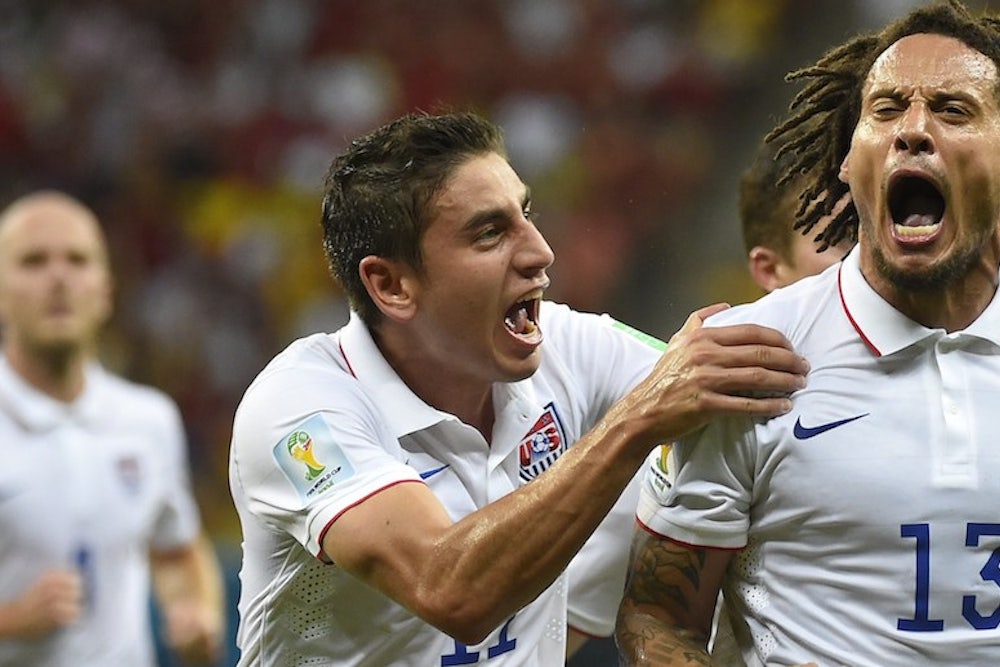Those words, that popular U.S. Men’s National Team chant, were never more true than 94 minutes into this game, when all of America seemed to collectively let down our guard and start uncorking the mental champagne to celebrate an all-but-guaranteed trip into the Round of 16. I was as guilty as anyone, cheerfully speculating that we could play Algeria, and starting a Tweet reveling in the victory. And then Bradley was stripped of the ball at midfield. It was played forward to Ronaldo along the right flank, who measured up a perfect cross to Silvestre Varela, who headed home an equalizer in the last play of the match. And just like that, everyone in this Group of Death is still, somehow, alive.
What are they trying to do to us? This World Cup has been an emotional roller coaster that should come with a height limit, and warnings for people with heart trouble. This was almost the exact opposite of the Ghana contest. Save two mental lapses, one at the very beginning, and one at the end, the U.S. was clearly the better side in the Amazonian steam room of Manaus.
The first error in the seventh minute felt like an inexplicable gut punch. Geoff Cameron—in a move seen frequently in public school soccer matches—hit a foul pop-up clearance back over his head right to the feet of Nani, who calmly waited until Tim Howard sat on the ground, before rifling the ball into the upper corner of the net. It was a horrible mistake for Cameron, who’d performed admirably in the Ghana match. It appeared to shake him up, and Cameron never regained his confidence for the rest of the game.
To their credit, the U.S. didn’t freak out or fall apart. They actually started pulling things together, thanks to Besler’s masterful organization and tackling in defense, and incredibly productive runs down the flank by Fabian Johnson, who is quickly turning into our Jason Bourne, a deadly weapon with a somewhat hazy German backstory. In the 54th minute, one of his runs nearly produced a goal when he touched the ball in for Michael Bradley with a nearly open net in front of him, but Ricardo Costa rudely cleared the ball off the line.
Ten minutes later, Jermaine Jones happened. A partially cleared corner fell to him ten yards outside the box, and Jones took one touch to his right, decided against slide tackling himself, and smoked a Roberto Carlos-esque curling dart into the right hand corner of the net. Portugal goalkeeper Beto didn’t even move. “My goodness,” said an audibly astonished Taylor Twellman, “if you’re going to score your first World Cup goal, it might as well be like that.”
Though the goal should help him get noticed by the public-at-large, Jones was already proving to be an invaluable asset—one of the top three U.S. players on the pitch, capable of both instilling fear in opposing midfielders for his Ray Lewis-level tackles and being a credible offensive talent. Plus, he has cool tattoos.
The match remained level for the next 15 minutes, and then in the 81st, 20-year-old Seattle Sounder DeAndre Yedlin—who Jurgen had masterfully selected to replace a visibly tired Bedoya—made a Fabian-style run down the right side, and played the ball back into the box where it bounced around to Bradley, who squibbed a shot over to Zusi, who gamely chipped the ball back across the net to Dempsey, who basically upper-groined the ball into the net.
And so—all we had to do to taste the glory of the Round of 16 was hold off Portugal for 14 more minutes. Wondo came in for Dempsey to basically just run around on fresh legs like a toddler playing tag, and hold the ball up if it came to him. Omar Gonzalez came in for Zusi to add an extra defender, and scare all the U.S. fans, because he’s Omar Gonzalez. Crucially, when Zusi took his sweet time leaving the field, the fourth official added another minute to extra time.
And so things held until that 94th minute. The ball was high in the air, and Michael Bradley underneath it with plenty of space around him. If—like 95 percent of the time—he controls the ball, and lofts it into a corner, or thwacks the ball out of bounds, or does one of several things Bradley has proven to be so good at over the past few years, the USA wins. But fate is choosing a darker path for Bradley in this tournament. His touch was heavy, he was relieved of the ball by Eder, it went to Ronaldo, and over to Varela, and into the back of our net. And then the game ended.
Not knowing what to do with myself, I asked my wife to take a walk. She agreed, mostly because she was worried I’d wander off into traffic. As we walked down the street by our house, she tired quickly of my whiny complaints about the draw, and said, “A month ago, you were predicting the U.S. wouldn’t get out of their group, and now you’re upset when they tie the fourth-ranked team in the world? How about a little perspective?!”
And yes, of course, she’s right. On the whole, drawing (and really dominating) that highly regarded side is a monumental achievement. Sitting atop the Group of Death alongside the Germans after two games with our fate in our hands, sporadically playing a level of soccer we’d have previously thought unfathomable, and doing it with everyone from a 20-year-old Seattle native, to a 27-year-old Kansan, to a 32-year-old from Frankfurt, Germany, deserves kudos. Plus, now I can honestly go into this Germany game knowing that if we play soccer like this, “I believe that we will win” becomes less a chant, and more a prediction.
